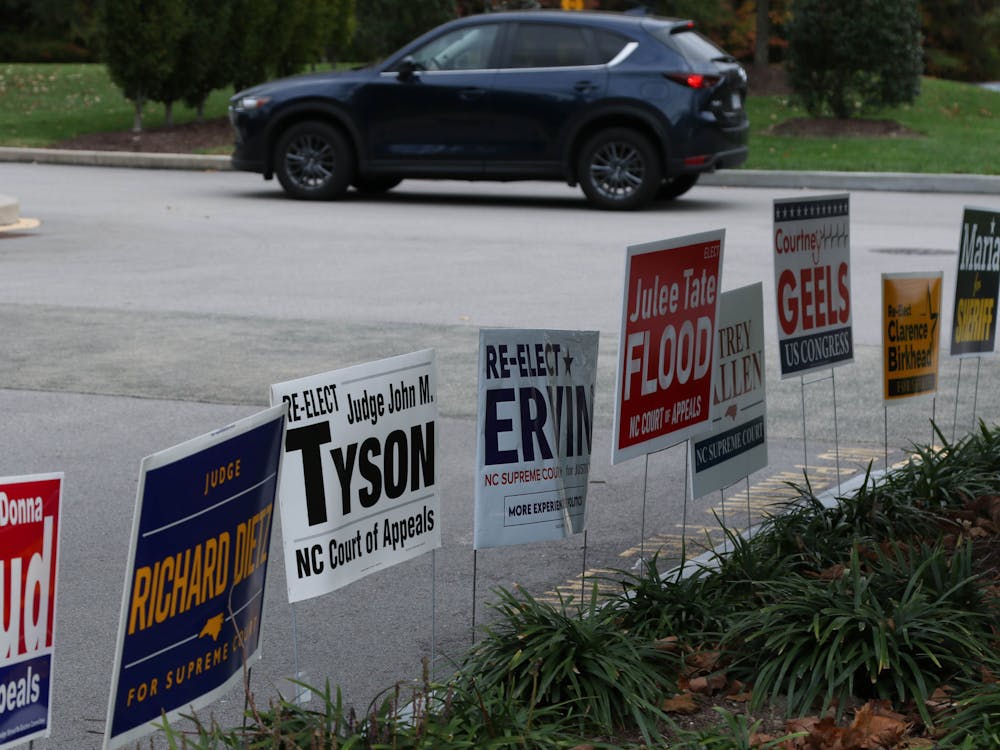The U.S. Senate race in North Carolina between Cheri Beasley and Congressman Ted Budd might be garnering lots of attention, but the 2022 midterm elections will determine the balance of power in the North Carolina General Assembly and Supreme Court. They may also decide the future of abortion access in North Carolina.
Despite an initial wave of advocacy from Democrats after the Supreme Court’s Dobbs v. Jackson decision in June, which reversed nearly 50 years of precedent protecting the right to an abortion, election experts expect 2022 to be a good year for the Republican party.
Mac McCorkle, Law School ’84 and professor of the practice in the Sanford School of Public Policy, described the midterm elections as traditionally a “bad time for that incumbent party” in the U.S. Congress. The results of the election usually compensate for the President’s party “overwinning” in the previous cycle.
However, because current control of the U.S. Congress is so close, with 212 Republicans and 220 Democrats, “you might not see as big a sweep, as you usually do against the incumbent party,” McCorkle said.
Christopher Cooper, Robert Lee Madison distinguished professor of political science and public affairs at Western Carolina University, seconded McCorkle’s analysis.
“It's not going to be a blue wave. Is it going to be a red wave? Is it going to be a red ripple? Is it going to be something in between?” he said.
Voter turnout
As of Oct. 6, mail-in absentee voting ballot requests are already double the requests from 2018.
But according to Cooper, little suggests the 2022 midterm election will be a “radically different kind of election in North Carolina.”
“I think it does illustrate that American politics despite the outsized personalities, despite the scandal, despite the polarization is actually remarkably stable and predictable,” he said.
After the Dobbs decision, female voting turnout was expected to rise substantially. However, early voting data does not suggest this.
While there are still a lot of votes to count, “if we were going to see a big effect, I would have thought we'd see some glimpse of it now,” Cooper said.
North Carolina General Assembly
State Republicans lost their supermajority in 2018, but they only need to pick up two seats in the Senate and three seats in the House of Representatives this Election Day to have a three-fifths majority in each chamber — enough to override Democratic Gov. Roy Cooper’s veto.
The supermajority makes the critical difference between the “state government passing very little, and the Republicans being able to pass essentially whatever they want,” Professor Cooper said.
As of July 2022, Gov. Cooper has issued 75 vetoes during his first six years in office and he has issued more vetoes than any other governor in North Carolina history.
In Gov. Cooper's first two years in office, he vetoed 28 bills, but 23 were overridden by the GOP supermajority. In 2018, Democrats regained enough seats to sustain every veto from the governor since then.
If Republicans win three-fifths of the seats, party leaders have declared they intend to pass more restrictions on abortions and reconsider some of the bills Cooper already vetoed.
“North Carolina is a safe haven for abortion rights access,” McCorkle said, but that could change if Republicans gain a three-fifths majority.
While many of the races across the state are considered safe for either party, there are a few races experts say people should pay attention to on election night.
Get The Chronicle straight to your inbox
Sign up for our weekly newsletter. Cancel at any time.
There are two senate races that McCorkle considers indicators of the overall results.
“If you see Mary Wills Bode winning in Senate District 18, [it will] probably be a good night for Democrats. If [incumbent Sydney] Batch loses in District 17, it’s probably going to be a good night for Republicans,” McCorkle said.
Additionally, Cooper emphasized the significance of the races in House District 63, which covers Alamance county, and Senate District 7, which covers New Hanover County.
Cooper expects the most likely outcome to be that Republicans have a strong majority, but he would not be surprised if the GOP picks up the five critical seats.
In the legislative races, Republicans have an advantage because the Democratic vote is too concentrated in North Carolina’s bigger cities, according to McCorkle.
“Democrats win too many districts too easily, and are not competitive in other places,” he said.
With just a simple majority, “the Republicans are not going to propose any massive change to abortion in North Carolina, because they know that Roy Cooper will veto it and will not become law. If they get the supermajority then Roy Cooper has about as much say so over abortion law in North Carolina as the readers of The Duke Chronicle,” Cooper said.
U.S. Senate race
At the national level, much is at stake in the race between Democratic candidate Cheri Beasley and Republican Congressman Ted Budd. If Beasley wins, she would be North Carolina’s first Black U.S. senator.
Cooper does not describe North Carolina as a top tier Senate race this cycle, due in part to the political party's funding strategy.
“It’s a self fulfilling prophecy. If the parties don't invest in the seat — specifically if the Democratic Party doesn't invest in the seat — it's not going to be competitive,” he said.
McCorkle reflected on the “plainness” of the North Carolina Senate race in comparison to Georgia and Pennsylvania.
“You don't have these characters that seem almost out of a TV melodrama with you know, like, Herschel Walker or Dr. Oz,” he said. “Budd and Beasley are more plain characters.”
McCorkle suspects that the national media is tired of North Carolina as a toss-up narrative. Even though Democrats get close to winning in the Senate races, unless it’s a really good Democratic year, “they usually lose.”
North Carolina has not sent a Democrat to the Senate since Kay Hagan won in 2008.
Budd has a slight advantage in several recent polls, including those released by East Carolina University, The Trafalgar Group, and Civitas.
The ECU poll showed Budd with a six point lead over Beasley, while Trafalgar placed Budd 4.2 percentage points ahead of the Democrat. Both of these results were outside each poll’s margins of error.
However, the Civitas poll showed Budd leading by 3.8 percentage points, barely within the poll’s margin of error of 3.99.
“The recent polls look better for Budd, but this is far from a landslide,” Cooper said.
Even though past trends and polls are in Budd’s favor, McCorkle is not fully convinced the race is over.
“Maybe North Carolina has changed in ways we don't know or there's a Kansas effect on abortion,” he said.
NC Supreme Court
Seat 3 and 5 of the North Carolina Supreme Court are on the ballot this November. If a Republican wins one of these seats, the GOP would have control of the court.
According to Cooper, the GOP candidates, Richard Dietz and Trey Allen, are leading in the polls.
“In the last half decade [there has been] a real battle in North Carolina politics where the General Assembly is asserting power,” Cooper said. “And every now and again, the courts provide some check on that power.”
Over the last five years, the General Assembly has asserted power, but the courts have been able to provide checks on that power, Cooper said.
“If the Republicans take those seats, the conventional wisdom is that on issues of gerrymandering, redistricting and voter ID, that the court would make a very, very different decision,” Cooper said.
Why students should vote
In 2022, “everything is on the ballot,” and the outcomes will have a “larger impact on your life than who the President is,” Cooper said.
McCorkle said that people should always care about voting, especially because of the growing crisis about the future of democracy.
“It’s a simple act. It may seem inconsequential to people, but it really is going to matter that people are affirming their belief that whatever problems we got now, this is still a great country with great promise,” he said.
Data visualizations created by Kathryn Thomas.

Kathryn Thomas is a Trinity junior and new reporter coordinator of The Chronicle's 119th volume. She was previously news editor for Volume 118.

